- Home
- Andy McNab
Bravo two zero Page 15
Bravo two zero Read online
Page 15
"We'll head south and box it," I said into Bob's ear, and he passed the message down the line.
We patrolled as before with Legs as scout. We had gone about a mile when we came to a mound of high ground to our front. We chose to go through a saddle, and as we moved towards it, Legs stopped. He got on his knees and lay down. We were right out in the open.
I got on my belly beside him, slowly and deliberately. He pointed up.
There was a head on the ridge line about 150 feet away. We watched him as he shuffled around, but I couldn't see any others. I indicated to the patrol by pointing east that we'd have to box around the position.
We circumnavigated the high ground for about 1,200 feet and headed west.
We encountered static interior vehicle lights on the other side of the high ground. We had walked into a laager of vehicles parked up for the night. Again we had to back out, head south, then try again heading west. We came across more troops and tents. We turned south again for a half mile, then west again, and at last were in the clear. These encounters had cost us a good two hours, and we didn't have time to spare.
We pressed on towards Syria along the higher ground. By now we were at an altitude of over 1,000 feet, and it was colder than we could have imagined. The area looked like a NASA photograph of the moon, bleak and white, with random outcrops of higher ground. The hills funneled the wind towards us. We had to lean hard into it as we pushed into the gaps. We came to an area of scorched earth that was broken by craters and tank berms. It could have been an old launch site or the scene of a battle. The craters were full of water, snow, and ice, and reminded me of photographs of the Somme.
We had agreed that if anybody started to suffer from exposure, they were to say so at once and not play the hard man. At anybody's request we would come down as fast as we could or find some area out of the wind.
If we had to stay up there for the following day, we'd die. We were still soaked and frozen. In the early hours, Mark started going down.
"We've got to get off the high ground because I'm suffering severely here."
We stopped and I tried to think. It wasn't easy to concentrate. Icy rain was now driving horizontally into my face. My mind was a blur of wet and cold, and it was hard to shut out the pain for long enough to think. Did we go forward west and try to get over the high ground and hopefully find some cover? Or did we go back to where we knew we would be out of the wind? I decided we must come off the high ground for Mark to have any chance of survival.
The only place we knew for sure was out of the wind was back at the area of the riverbed near the meta led road. We came down more or less parallel with the road but about 600 feet away from any possible headlights. We couldn't be arsed with navigating: there was not enough time-we needed to get back and recover, and we didn't want to be out in the open at first light. It was a really bad two hours as we made our way down. We tabbed as fast as we could, and just before first light we found a position, a depression in the ground, a compromise between concealment and keeping out of the elements. We would try again tomorrow.
It was a dip no more than three feet deep. We got in and cuddled up. It was heartbreaking. We had traveled a horrendous number of kilometers just to make less than 6 miles northwest. But it was better to lose a night's distance than to lose a man. We could see the meta led road about a mile to the north. The depression ran along the line of the wind, but we were out of the worst of it. We cuddled up and kept our eyes open.
At first light on the 26th we checked that we weren't sitting on top of an enemy position. There was only one piece of ground that overlooked us, and as we were huddled up against one edge of the depression, it cut the chances of anybody seeing us.
The weather had changed. There wasn't a cloud in the sky, and when the sun came out, it was quite comforting, psychologically, though it was still very cold. The wind was still biting and we were soaking wet.
I had a pair of small binoculars, an excellent bit of kit that I'd bought at a jeweler's in Hereford. I looked north at the road that went up to a pumping station. There was a steady stream of vehicles, one every few minutes: oil convoys, water bowsers, civilian Land Cruisers with the husband driving and the wife all in her black kit sitting in the back. The vehicles normally came in groups of three or four. There were also lots of military convoys, consisting of armored vehicles and trucks.
Looking south I saw pylons a mile or so away that ran southeast-northwest, parallel to the road. Three or four vehicles also headed southeast along the line of the pylons as if following them as a navigational aid. We were sandwiched between the two.
We cuddled each other for warmth, trying to keep our eyes open but frequently dozing off and waking up with a start. We had survived the night, and now I just hoped that we could hold out until last light again.
We sorted our feet out. This is done in such a way that at any one time only one person has one boot off. We were well used to harsh tabbing in tough conditions, but last night's efforts had taken the biscuit. We had tabbed for twelve hours, covering well over 30 miles, in the worst weather conditions any of us had seen for a very long time. Our feet had taken a fearsome pounding.
Dinger remembered that Chris had been wearing a pair of GoreTex go-fasters that had set him back a hundred quid. "If he's still running around, I bet his feet are Okay in them Gucci boots," he said, massaging his sore toes.
We got some cold scoff down us. We wouldn't cook because the ground was too open. We had enough sachets of food to last a few days yet; water was the more pressing concern.
We rested and plotted. The big plan now was to take the high ground tonight, get over it, then hit the low ground, which according to the map was flat gravel plain that would take us into the border. In theory we could get over the border that night if we really went for it. All it would take was another twelve hours all out tabbing. On the positive side, we weren't carrying much weight because all we had was our belt kit and our weapons. And we had the incentive, which was to get out of Iraq and into Syria. We had no idea what the border was going to be like; we'd just have to find out when we got there.
We did our map studies again to make sure we all knew where we were, where we were going, and what we were likely to see on the way-which wasn't a lot because we were working with air maps. The alignment of pylons and so forth is approximate on these maps, but we did know that we'd have a major built up area about three hours north of us to our right. That seemed to be the only fixed obstacle.
We were all recovering quite well now. We whispered bad jokes to each other as the hours passed, trying to keep up morale. Everything was beginning to feel all right again. We were still cold, but we had it under control. At least it wasn't snowing or raining any more. I was confident that we would be able to do it in one last big effort.
It was at 1530 that we heard it.
Ding ding, baa baaa.
We really don't need this, I said to myself.
I had a quick scan but couldn't see anything. We hugged the ground.
There was no hollering or shouting as there was before in the last compromise, just the sound of chuntering and a solitary bell. It got closer and closer. I looked up, and there was the head goat with a bell around his neck. Wherever he went, it seemed, the other goats followed, because his entourage came and joined him one by one. Soon there were ten of them standing gawping over the edge of the dip. They looked at us and we looked at them. I lobbed a couple of small pebbles at the head boy to try and shoo him away.
His response was to come forward even more, and the rest of the goats followed. They put their heads down and started chewing, and there were five sighs of relief. They were a bit premature. A few seconds later the old goatherd turned up. He must have been 70 if he was a day. He had a big woolly dish-dash on, with a baggy old cardigan over the top.
His head was swathed in a shamag. Over his shoulder was a tatty leather satchel. He had beads in his hands and muttered "Allah" as he pushed them through his fi
ngers.
He looked at us and didn't miss a beat. No surprise, no fright, no nothing.
I smiled at him, as one does.
Totally nonchalantly, as if it was an everyday occurrence to find five foreigners huddling in a dip in the ground in the middle of nowhere, he squatted down beside us and started gob bing off. I didn't have a clue what he was saying.
We gave him the greeting, "As salaam alaikum."
He replied, "Wa alaikum as salaam."
We shook his hand. This was bizarre. He was so friendly. I wondered if he even knew there was a war on. Within seconds we were all best mates.
I wanted to keep the conversation going, but our Arabic wasn't quite up to it. Even as I spoke, I couldn't believe what I heard myself saying next.
"Wayn al souk?" I asked.
Here we were, in the middle of nowhere, and I was asking him the way to the market.
He didn't bat an eyelid, just pointed south.
"Good one," Dinger said. "At least next time we're here we'll know the way to Sainsbury's."
Bob spotted a bottle in the old boy's satchel. "Halib?" he asked.
The goatherd nodded that yes, it was milk, and passed the bottle around.
Then he got out some smelly, minging dates from the bag and a bit of old bread, and we sat down and played the white man.
Mark stayed on his feet, having a casual look around. "He's on his own," he said, all smiles.
The goatherd pointed south again and waved his hand. "Jaysh," he said,
"jaysh."
I raised a quizzical eyebrow at Bob.
"Army," he translated. "Militia."
Bob asked: "Wayn? Wayn jaysh?"
The old boy pointed back the way we had come.
We couldn't understand if he meant: there's loads of soldiers down there; or there's loads of soldiers down there, and they're looking for you; or are you with the soldiers from the jaysh back there? None of us could remember the Arabic for distance. We tried to do signs for far away and close.
All in all it was quite funny. There we were, sitting having a cosy kefuddle in the middle of the desert, in weather that was so bad we had nearly frozen to death.
We carried on with this for about half an hour, but we were getting to the point where a decision had to be made. Did we kill him? Did we tie him up and keep him until we moved out? Or did we just let him go and do his own thing? The only benefit to be gained by killing him was that nobody else would then know what was going on. But if the countryside was littered with the corpses of elderly members of the indigenous population and we got caught-which we had to assume was likely-then we could hardly expect red carpet treatment at the hands of our captors. If we tied him up to keep him out of play, he would be dead by first light anyway because of the cold. There was little doubt his body would be discovered. It looked as though every square foot of this country was patrolled by goats and herders.
If we let him go, who could he tell, what harm could he do? He had no transport, and as far as Mark could make out he was on his own. It was about 1600 hours now, and it would soon be last light. Even if he raised the alarm, by the time there was any reaction it would be dark and we'd be legging it towards the border. We might as well let him go.
It was the SAS we were in, not the SS.
We made up our minds that when he decided to go, we'd watch him, wait until he got out of sight, then we'd put in a deception plan south.
Five minutes later he was giving his goodbyes, and off he shuffled with the goats, not a care in the world. We let him go for about a half mile until he disappeared into some dead ground, then we moved off. We went south for a few miles, then turned west.
We came into a small depression and stopped to take stock. There were several factors to discuss. First was our water supply. We had enough food to last us another couple of days, but we were almost out of water.
Second, we had to assume that the enemy knew where our last LUP was from the night before, so they knew our direction of travel. Third, we'd had another compromise-I was already thinking that we should have kept him with us until last light before letting him go. We were still in bad physical shape, and the weather would get very bad up on the high ground. We had nearly died the night before, and I didn't want to take another chance. We had lost a night's march and didn't want to lose another. All in all, the situation was not very good, and we probably hadn't done ourselves any favors by letting the old boy go. But what was done was done.
We went through the options that we had left to us as a patrol. One, to keep west, hoping to find water on the way: the chances were good on the high ground due to the snow and ice. Two, to head north to the river and then head west, but we were a large number and concealment would be a problem because the closer we got to the border, the more habitation there was going to be. Three, to hijack a vehicle and drive for the border that night. It was 1715 and starting to get dark. Given the amount of enemy activity and our physical condition, we decided to go for the vehicle hijack, any time after last light. The sooner the better.
We were going to have some major drama tonight, one way or another.
Before moving down towards the road we carried out a weapon check. One man at a time, we pulled the working parts out, slapped on some oil, and made sure everything was ready.
I scanned the road through my binos. We wanted to have an area where we could come out and be more or less straight on top of them, so they couldn't see us coming. I spotted a small mound on a patch of high ground that would do the trick.
The plan was that Bob would play the cripple, leaning on my shoulder, and I'd wave down a good Samaritan. To make us look even more harmless we'd leave our weapons and webbing with the others. They would come out, do the hijack, and away we'd go. We'd been looking at nothing but lorries and Land Cruisers for six hours. Depending on the type of vehicle, we could go cross-country-heading south until we hit the pylons and then following them west-or take our chances on the road.
The road was half an hour's tab away. We got to the highish ground just on last light. Legs found a purpose-made ditch in the area to the right of the road, and we all piled in. We had a good view to the southeast because the road was long and straight for a number of miles and we were on high ground looking down. To the northwest, however, there was a small crest about 900 feet down the road. We wouldn't have much time in which to react if the vehicle came from that direction. Bob and I would try to stop it right opposite the ditch so the lads could just jump up and give them the good news.
We sat there with the binos out, looking to the east. Two trucks moved along the road and then went off in the general direction of our last LUP. Because of the low light I couldn't see whether people were getting out, but there appeared to be general activity on both sides of the road. They were obviously looking for something, and I took it to be us. After a while the vehicles came back onto the road and started to move towards us.
Fuck! Was this the follow-up from the night before? Either we were lucky that we had moved, or unlucky that we hadn't held the old boy and had let him go and bubble. But he had gone in totally the opposite direction to the one these troops were coming from. It didn't make sense.
We watched the lights coming nearer, and then we could hear the engine grinding up the hill. We got our heads down, just hoping that the elevation of the trucks would not give any blokes in the back the chance to see down into the dip.
We waited. As soon as we heard the trucks stop opposite us, we'd be up and firing. We had nothing to lose.
They drove straight past. Big grins all round.
Bob and I moved up onto the road and sat watching in both directions.
After about twenty minutes, vehicle lights came over the small crest and drove towards us. Satisfied that it was not a troop truck, we stood up.
The vehicle caught us in its headlights and slowed down to a halt about 10 feet down the road. I kept my head down to protect my eyes and to hide my face from the driver. Bob and I
hobbled towards it.
"Oh shit," I muttered into Bob's ear.
Of all the vehicles in Iraq that could have come our way that night, the one we had chosen to hijack and speed us to our freedom was a 1950s New York yellow cab. I couldn't believe it. Chrome bumpers, whitewall tires, the lot.
We were committed. Bob was in my arms giving it the wounded soldier.
The blokes were straight up from the ditch.
"What the fuck have we got here?" Mark shouted in disbelief. "This is the story of our lives, this is! Why can't it be a fucking Land Cruiser?"
The driver panicked and stalled the engine. He and the two passengers in the back sat staring openmouthed at the muzzles of Minimis and 203s.
The cab was an old rust bucket with typical Arab decoration-tassels and gaudy religious emblems dangling from every available point. A couple of old blankets were thrown over as seat covers. The driver was beside himself with hysteria. The two men on the backseat were a picture, both dressed in neatly pressed green militia fatigues and berets, with little weekend bags on their laps. As the younger of the two explained that they were father and son, we had a quick rummage through their effects to see if there was anything worth having.
We had to move quickly because we couldn't guarantee that there wouldn't be other vehicles coming over. We tried to shepherd them to the side of the road, but the father was on his knees. He thought he was going to get slotted.
"Christian! Christian!" he screamed as he scrabbled in his pocket and pulled out a keyring with the Madonna dangling from it. "Muslim!" he said, pointing at the taxi driver and trying to drop him in it.
Now the driver sank to his knees, bowing and praying. We had to prod him with rifle barrels to get him to move.
"Cigarettes?" Dinger enquired.
The son obliged with a couple of packs.
The father got up and started kissing Mark, apparently thanking him for not killing him. The driver kept praying and hollering. It was a farce.
"What's his problem?" I said.

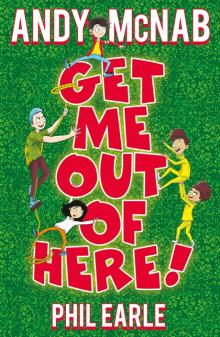 Get Me Out of Here!
Get Me Out of Here!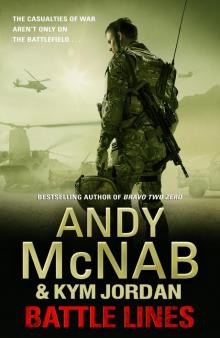 Battle Lines
Battle Lines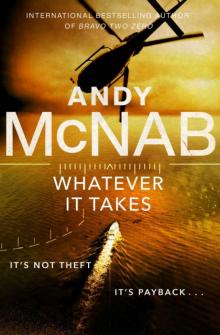 Whatever It Takes
Whatever It Takes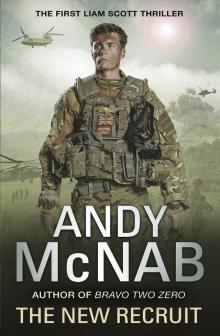 The New Recruit
The New Recruit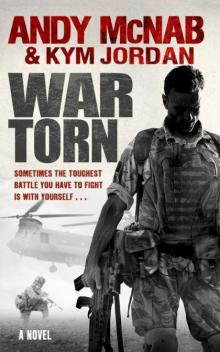 War Torn
War Torn Brute Force
Brute Force Crossfire
Crossfire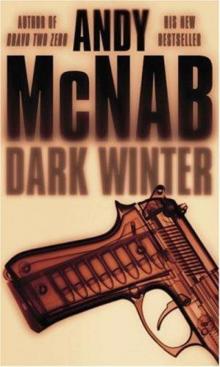 Dark Winter ns-6
Dark Winter ns-6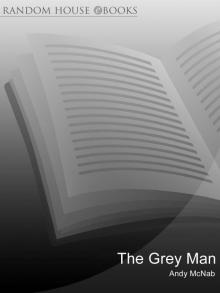 The Grey Man
The Grey Man Spoken from the Front
Spoken from the Front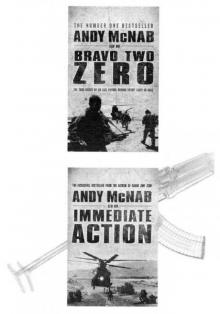 Meltdown
Meltdown Recoil
Recoil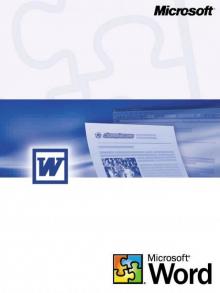 Nick Stone 1 - Remote Control.
Nick Stone 1 - Remote Control.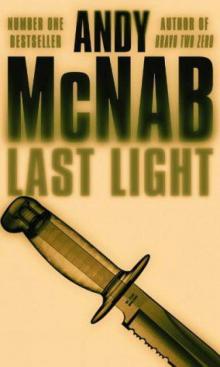 Last Light ns-4
Last Light ns-4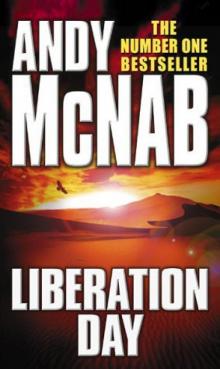 Liberation day
Liberation day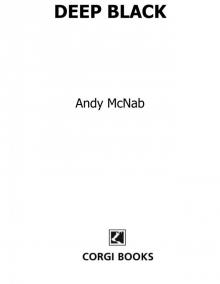 Deep Black
Deep Black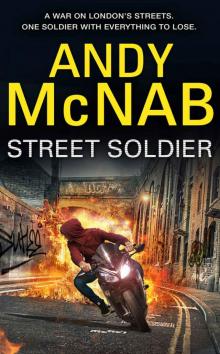 Street Soldier
Street Soldier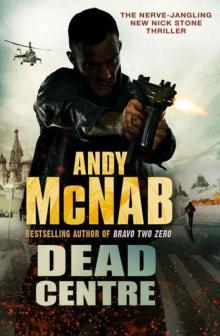 Dead Centre ns-14
Dead Centre ns-14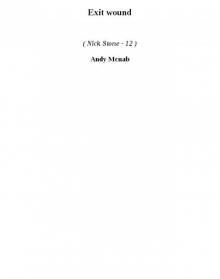 Exit wound ns-12
Exit wound ns-12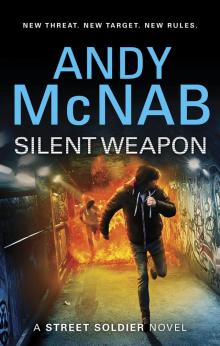 Silent Weapon
Silent Weapon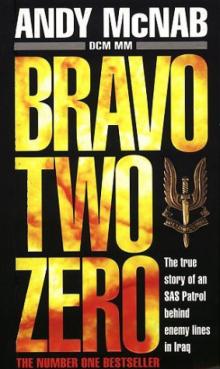 Bravo two zero
Bravo two zero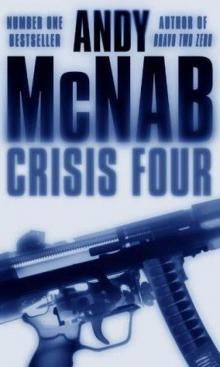 Crisis Four ns-2
Crisis Four ns-2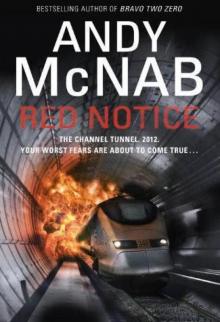 Red Notice
Red Notice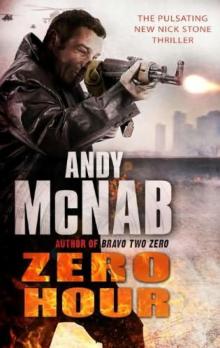 NS13 Zero Hour
NS13 Zero Hour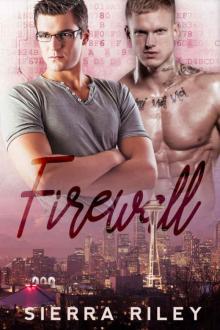 Firewall
Firewall Last Light
Last Light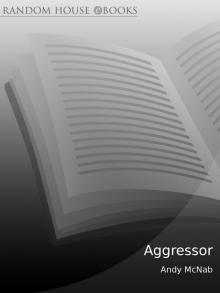 Aggressor
Aggressor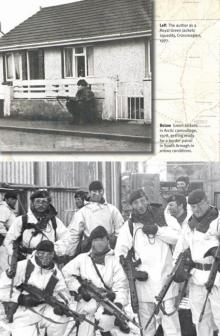 Seven Troop
Seven Troop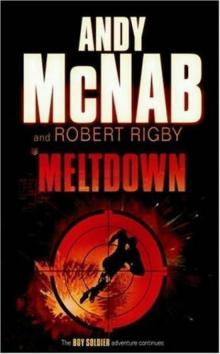 Meltdown bs-4
Meltdown bs-4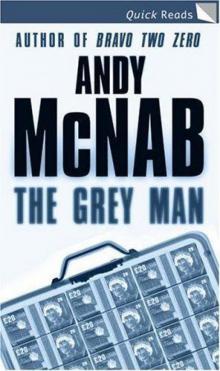 The Grey Man (quick reads)
The Grey Man (quick reads)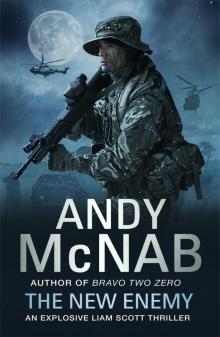 The New Enemy
The New Enemy Avenger
Avenger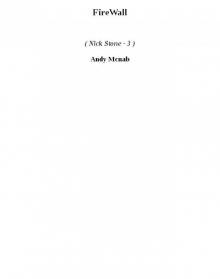 FireWall ns-3
FireWall ns-3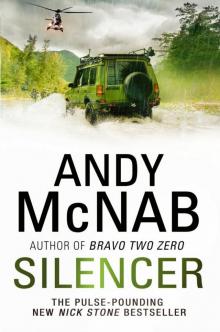 Silencer
Silencer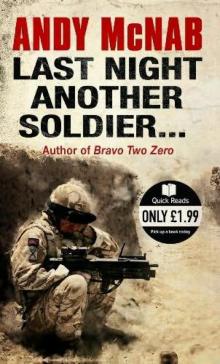 Last Night-Another Soldier…
Last Night-Another Soldier…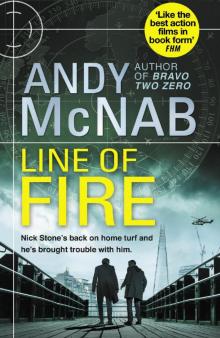 Line of Fire:
Line of Fire: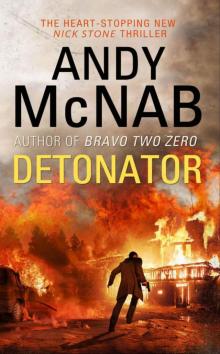 Detonator
Detonator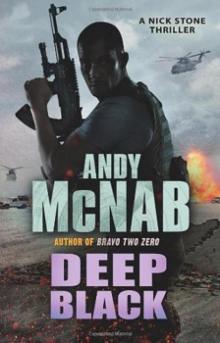 Deep Black ns-7
Deep Black ns-7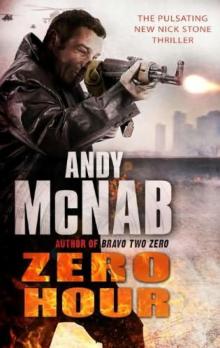 Zero Hour (2010) ns-13
Zero Hour (2010) ns-13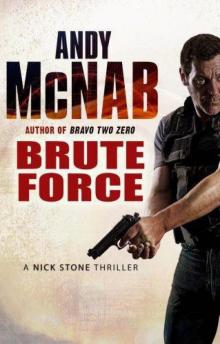 Brute Force ns-11
Brute Force ns-11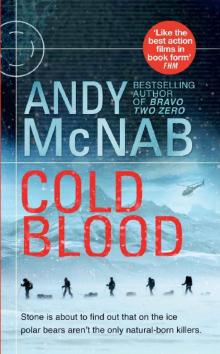 Cold Blood
Cold Blood Terminal Velocity
Terminal Velocity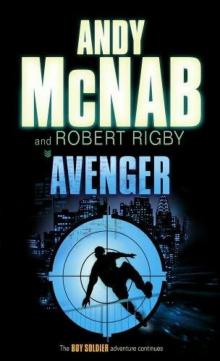 Avenger bs-3
Avenger bs-3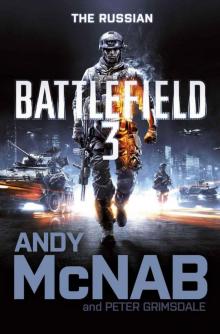 Battlefield 3: The Russian
Battlefield 3: The Russian DropZone
DropZone Zero Hour
Zero Hour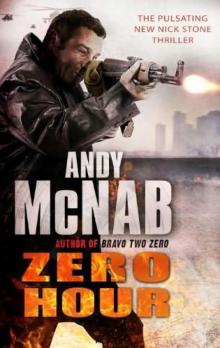 NS13 Zero Hour (2010)
NS13 Zero Hour (2010)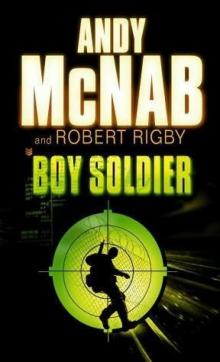 Boy soldier bs-1
Boy soldier bs-1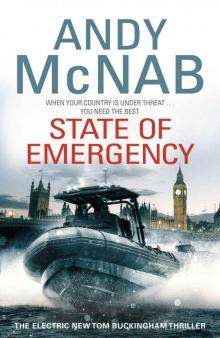 State Of Emergency: (Tom Buckingham Thriller 3)
State Of Emergency: (Tom Buckingham Thriller 3)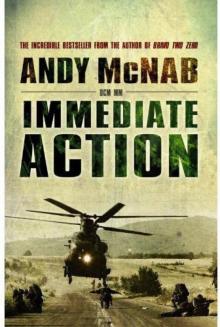 Immediate Action
Immediate Action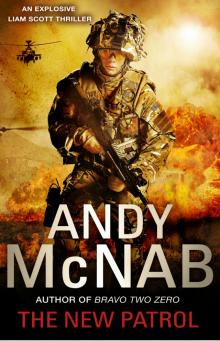 The New Patrol
The New Patrol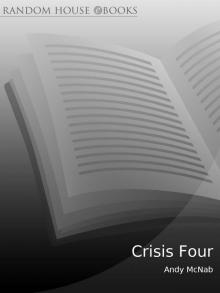 Crisis Four
Crisis Four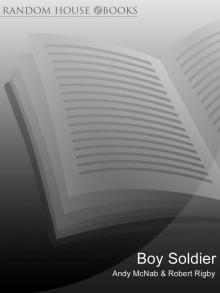 Boy Soldier
Boy Soldier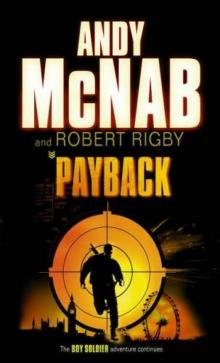 Payback bs-2
Payback bs-2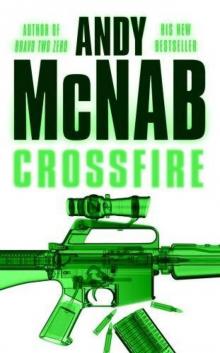 Crossfire ns-10
Crossfire ns-10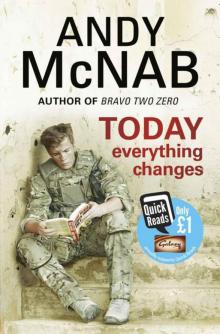 Today Everything Changes: Quick Read
Today Everything Changes: Quick Read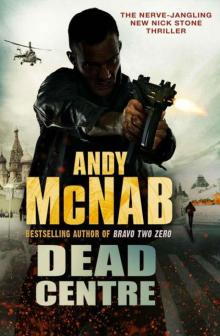 Dead Centre
Dead Centre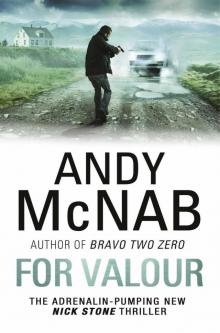 For Valour
For Valour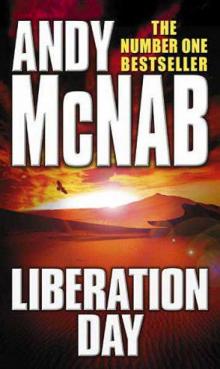 Liberation Day ns-5
Liberation Day ns-5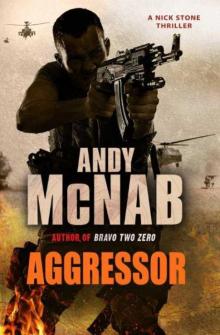 Aggressor ns-8
Aggressor ns-8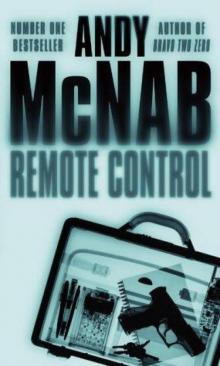 Remote Control ns-1
Remote Control ns-1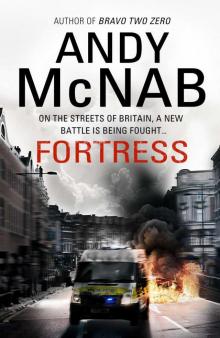 Fortress
Fortress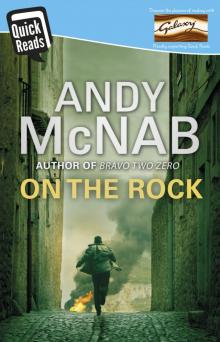 On the Rock
On the Rock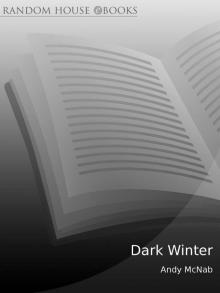 Dark Winter
Dark Winter